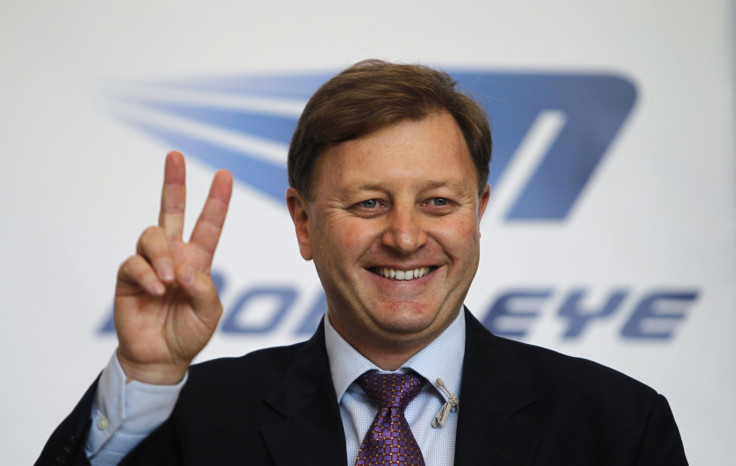Dow Jones Industrial Average Up Following Monday’s Rally; US Manufacturing Orders Dip

U.S. stocks opened Tuesday up slightly following a rally that sent the Dow Jones Industrial Average back into positive territory for the year. November is traditionally the end of a bearish trading trend that begins in August.
A strong dollar continues to weigh on U.S. factory orders, according to monthly data released by the U.S. Department of Commerce. Demand for manufacturing goods declined 0.1 percent in September after falling 2.1 percent in August. Factories have been grappling with excess inventory as a strong dollar has slowed demand for U.S. exports. But the drop in demand from U.S. factories, which accounts for about 12 percent of U.S. economic activity, was less than expected by economists.
The Dow Jones Industrial Average (INDEXDJX:.DJI) gained 65.47 points, or 0.37 percent, to 17,894 on Tuesday morning. The S&P 500 index (INDEXSP:.INX) rose a slight 0.66 points, or 0.03 percent, to 2,105. The Nasdaq composite (INDEXNASDAQ:.IXIC) closed up by 17.98 points, or 0.35 percent, to 5,145.
Seven of the 10 S&P 500 sectors were down Tuesday morning. Energy and materials stocks were up as traders sought to buy on the dips seen lately in those sectors. Visa Inc. (NYSE:V) led gains Tuesday among the 30 Dow components after the charge processor announced it was acquiring its former European arm for $23 billion.
U.S. new-auto sales data from the world’s top automakers released Tuesday ishowed an October jump of 13.6 percent, to 1.46 million vehicles, compared to the same month last year. it was the second consecutive month of sales topping 18 million on a seasonally adjusted annualized rate. This key measure of consumer sentiment and the state of the automotive sector is on track for a sixth consecutive year of growth and possibly the best year on record.
Global Markets
Key Asian markets were mixed Tuesday as Japanese stocks continued to respond negatively to weak signals in China’s manufacturing sector. Tokyo’s Nikkei was closed for a holiday on Tuesday. The Shanghai Composite Index lost 8.39 points, or 0.25 percent, to 3,317. But Hong Kong’s Hang Seng followed upbeat U.S. markets and gained 198.39 points, or 0.89 percent, to 22,568.
European shares were flat Tuesday afternoon. France’s CAC 40 index was up 19.97 points, or 0.41 percent, to 4,936. London’s FTSE gained 21.81 points, or 0.34 percent, to 6,384. The German DAX gained a slight 0.48 points, or 0.01 percent, to 10,951.
Oil Prices
Global oil prices gained on news of a Brazilian oil-sector strike and crude export interruption in Libya, according to the Wall Street Journal. West Texas Intermediate crude oil, the U.S. benchmark for oil prices, gained 3.34 percent to $47.68 per barrel for December delivery on the New York Mercantile Exchange. On the London ICE Futures Exchange, Brent crude, the global benchmark for oil prices, gained 2.87 percent to $50.19.
Earnings-Season Tuesday Market Movers
Archer Daniels Midland Company (NYSE:ADM) reported adjusted quarterly profit of 60 cents per share, or $252 million, for the July-September quarter, on revenue of $16.56 billion. The results released Tuesday before markets opened came in at 10 cents below Wall Street estimates. The Illinois corn processor cited a strong dollar and weak ethanol profit margins for its less-than-expected performance. The company’s share price dipped nearly 7 percent to $43.15 onTuesday in New York and continued to drop in after market trading. The company’s stock is down 17 percent for the year.
Kellogg Company (NYSE:K) reported a bigger-than expected sales drop in the July-September quarter on weak U.S. demand for its cereals and snacks. The Michigan-based maker of Rice Krispies and Cheez-It said its quarterly sales dropped to $205 million, or 58 cents per share, from $224 million, or 62 cents per share, in the same period last year. Revenue dropped to $3.12 billion from $3.64 billion in the same periods. Kellogg shares dropped more than 3 percent to $69.09 on Tuesday. Kellogg stock is up 4 percent for the year.
Sprint Corp. (NYSE:S) said it lost 15 cents per share in the July-September quarter, more than the 8 cents forecast by analysts. The Japanese-owned, Kansas-based wireless carrier narrowed its losses, to $585 million this year from $765 million last year. Revenue dropped more than Wall Street expected, to $7.98 billion from $8.49 billion. Sprint’s stock closed down more than 7 percent to $4.50 on Tuesday, but the price is up nearly 9 percent for the year.
Mobileye NV (NYSE:MBLY), the Israeli maker of autonomous driving systems, reported adjusted profit of 15 cents per share, beating estimates by 2 cents. Adjusted income rose from $13.3 million to $33.61 million. Sales increased from $34.7 million to $70.7 million in the same quarters. Mobileye’s stock clsoed up 2.55 percent to $46.67 on Tuesday. The price has advanced more than 15 percent this year.
King Digital (NYSE:KING) shares rallied by nearly 15 percent on Tuesday after the "Candy Crush" mobile game maker agreed to be bought by Activision Blizzard (NASDAQ:ATVI) for $5.9 billion or $18 per share in cash. Activision reported adjusted quarterly profit of 21 cents per share, 16 cents above estimates. Activision shares rose 3.62 percent on Tuesday. The company’s share price is up nearly 78 percent for the year.
Fitbit Inc. (NYSE:FIT) announced a beat on profit and sales estimates in the July-September quarter. But the San Francisco maker of wearable fitness devices that went public last year will soon float 21 million more shares, which put downward pressure on the company’s stock. Fitbit shares closed down nearly 9 percent to $37.26 on Tuesday.
The story was corrected to say Tokyo's stock exchange was closed for a holiday.
© Copyright IBTimes 2025. All rights reserved.






















